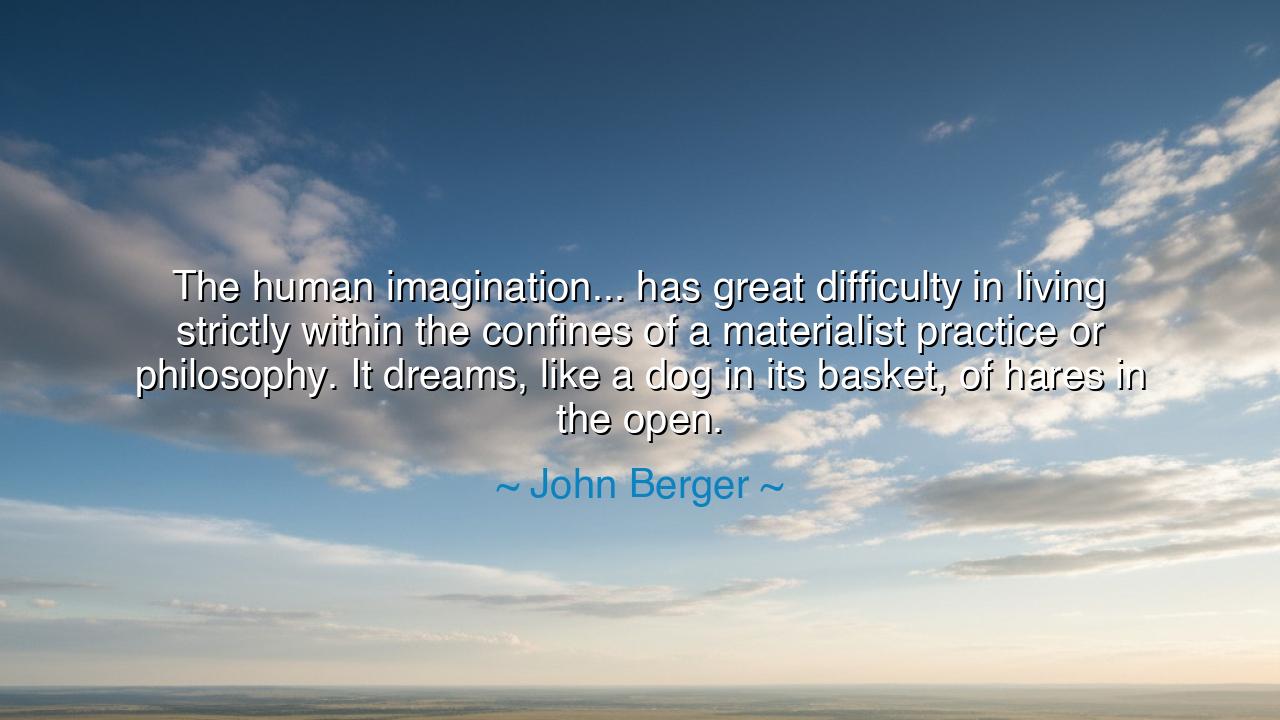
The human imagination... has great difficulty in living strictly
The human imagination... has great difficulty in living strictly within the confines of a materialist practice or philosophy. It dreams, like a dog in its basket, of hares in the open.






In the words of John Berger, the seer of art and humanity, we find one of the most profound meditations on the nature of the soul: “The human imagination… has great difficulty in living strictly within the confines of a materialist practice or philosophy. It dreams, like a dog in its basket, of hares in the open.” This is not merely an observation about art or philosophy — it is a revelation about what it means to be human. For Berger reminds us that imagination is the restless heartbeat of the spirit, forever straining against the walls of the tangible, forever yearning for what lies beyond the visible world.
To live “within the confines of materialism” is to dwell entirely in the realm of the measurable — to believe that only what can be weighed, touched, or counted is real. Yet the human soul was never built for such confinement. Like the dog in its basket, we may lie still within the cage of routine and reason, but somewhere deep within, our dreams still run. We see hares — symbols of freedom, motion, and pursuit — darting through the open fields of the unseen. Berger’s imagery is simple yet profound: no matter how tamed or rationalized our lives become, the imagination refuses to sleep. It leaps toward transcendence, hungering for mystery, poetry, and meaning.
From the dawn of civilization, mankind has wrestled with this duality — the material and the spiritual, the seen and the unseen. The builders of the pyramids raised monuments of stone, yet those stones were born from dreams of eternity. The philosophers of Greece, though grounded in reason, sought the essence of the soul beyond mere matter. Even in the most rational ages, the imagination continues to whisper its rebellion. It refuses to accept that life is only a collection of atoms and transactions. It demands beauty, purpose, story — it demands more. For though the body may live by bread, the spirit starves without wonder.
Consider the life of Albert Einstein, a man often mistaken for the purest embodiment of reason. Yet when asked about his genius, he did not speak of equations, but of imagination. He once said, “Imagination is more important than knowledge.” Though his work reshaped science, his vision was born from dreams — from the strange, almost mystical act of visualizing himself riding upon a beam of light. It was this leap of the mind, beyond the material, that revealed the fabric of time itself. Einstein, like Berger’s dreaming dog, lived within the physical world — yet his spirit ran freely through the meadows of thought.
The origin of Berger’s insight lies in his lifelong contemplation of art and society. He lived in an age where materialism — the worship of possession, production, and proof — threatened to silence the deeper voices of humanity. But he saw what others did not: that no philosophy, no economic system, no logic of consumption can wholly contain the human imagination. The artist, the lover, the philosopher — each bears within them a refusal to be reduced to utility. Even in poverty or oppression, the mind escapes; it paints its own skies, invents its own gods, and dreams its own freedom. That is the rebellion of the soul — that is the dream of the hare.
And so, Berger’s metaphor calls to all who feel trapped within the narrowness of the modern world. He tells us that the imagination is not a luxury — it is survival. It is the hidden pulse that keeps the spirit alive when the world feels mechanical and cold. The dog may seem still in its basket, but its dreams remind it of what it was made for — motion, instinct, pursuit. So too must we remember that no job, no routine, no material order can fulfill the infinite depth of the human heart. We must dream beyond the fence, lest we become numb to the vastness that is our birthright.
Therefore, my child, take this wisdom to heart: guard your imagination as a sacred flame. Let not the dullness of the world convince you that it is childish or vain. It is the divine gift that keeps you human, the whisper of eternity in your mortal frame. Seek beauty where others see only function. When the world demands that you be practical, dare to dream. When life confines you to your “basket,” do not forget the open field — for the dream itself is a kind of freedom.
And let this be the lesson: live in the world, but do not be contained by it. Earn, build, labor — but also wonder, create, and believe. For as John Berger knew, it is not the possessions of man that define his greatness, but the vastness of his imagination, ever chasing the invisible hares of truth and beauty across the boundless fields of the soul.






AAdministratorAdministrator
Welcome, honored guests. Please leave a comment, we will respond soon